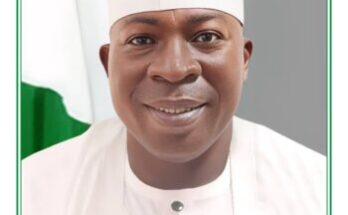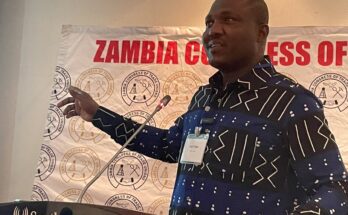Barrister Isaac Okpanachi, a legal practitioner, is involved in human capital development through investment in educational institutions. In this interview with ELEOJO IDACHABA, he says the quality of life reflects government’s success or failure.
Nigeria of yesterday appears better than today. When will you say was Nigeria’s golden moment?
Well, what I can personally refer to as Nigeria’s golden age was in the 70s when Generals Yakubu Gowon and late Murtala Mohammed were both Heads of State, respectively. Then, one can be proud to be identified as a Nigerian because the economy was vibrant and the local currency had value. As at 1984 when I travelled to London, one can make a purchase on a London street with naira currency because of the value. Sadly, Structural Adjustment Programme (SAP) was introduced and because of poor management of policies, the economy began to nosedive and the currency lost its value. Before then, one could buy a brand new Volkswagen car for N3, 200, but now only a few can buy brand new cars. Those were the golden moments of Nigeria.
From the moral perspective, what is the difference between that period and now?
What I can say is that descent into immorality is not as pronounced as failure of successive governments to help the people. Remember that not too long ago, precisely under former President Jonathan, the American government put pressure on him to formalise same sex marriage, but he refused. I think morality is not our problem, but erosion of values among urban youth who want to copy everything from the West hook, line and sinker without any consideration for the reason behind such. Some of those values are clearly not in our character. In essence, I will not say there is a total crash in morality, but an attempt to copy strange cultures that are not synonymous with Nigeria’s.
Is it correct to say today that governments at all levels, both in the present and past, have failed the people?
It is the quality of life of the people that determines whether the government is succeeding or failing. You can take a cue from what I said earlier about Nigeria’s golden moment in terms of the quality of life of the people then and now. For instance, in the late 60s up till early 70s, if you have 10,000, one can build a three- bedroom apartment in any government-approved location in Nigeria, but that is no longer the case. You can imagine the effect of this on the lives of the people. This is because when the currency, for example, loses its value, automatically, it affects the people. Basically, being a mono-product economy, it affects the lives of the people. That is where failure of leadership comes in. The government over the years abandoned agriculture which is the real strength of the economy and has better value than oil which everybody is clamouring for. It behooves on the government to ensure that Nigeria goes back to the days of palm oil, cocoa, groundnut, rubber, cereal and tubers so that we can recover from the shock oil has brought on the people and take over from Malaysia, Indonesia, India and even China.
It’s said that Nigeria needs constitutional amendment and total restructuring. Do you think this is the way forward?
I was born three years before Nigeria gained independence; so, I still recollect all the vibes associated with independence then especially few days to October 1, 1960. As at that time, we had regional governments in the North, West and East with each of these developing at their own pace through what we called commodity boards established for each of the products peculiar to each region. This was how each of these regions was competing healthily. They kept whatever revenue that accrued to them and remitted some percentages to the centre in line with the provision of the existing laws. By this arrangement, each of them produced the three autonomous universities in those regions. That was how we had former University of Ife, now Obafemi Awolowo University, University of Nigeria Nsukka and Ahmadu Bello University before they were taken over by the government along with the University of Ibadan and others. Remember too that as far back as 1959, the first television station in Nigeria was established in Ibadan through funding from regional governments. In all of these, the regions were controlling their resources and there was no oil that would make everyone queues to the centre for fund. Any situation where people have to gather to share money is laziness because nothing would move anybody into hard work and creativity.
Suddenly, those who were into subsistence and mini commercial agriculture decided to leave the rural areas into urban centres in search of jobs. We forgot that the advantage Nigeria has is not in oil but soil. Therefore, if Nigeria can realise that her huge advantage is in agriculture, the country would take a leap ahead of other nations that are presently ahead of us. What I’m saying here is that Nigeria was able to stand on her feet because of the way the country was run right from independence through some of the values bequeathed to us by the colonial masters which were eroded through the loose federation we now practise. May be that is why we need constitutional amendment. That is the reason parastatal agencies like Nigeria Airways and others died. Thank God for the revival of Nigeria Railway Corporation lately, but way back, it used to be one of the best in the country with towns like Kafanchan, Otukpo and others built around it.
What then is the solution to all these problems?
Basically, we have to go back to the land and stop deceiving ourselves. In the light of the recent and ongoing agitations by the youth, it behoves on the government to prioritise the issue of youth employment. This is not about over-bloating the civil service, but to genuinely look out for ways of meaningfully engaging the youth in agro-allied businesses through partnership arrangement. Let’s look for persons who know how to manage farms very well. Let there be a scheme that would get all the graduates busy after their youth service whether they are trained in agriculture or not because that is the area we have greater advantage. In a nutshell, let the government look for easy way of putting money in the hands of those who are enterprising enough in the area of farming because that is where we have relative advantage over other countries. If youths with enterprising spirit are given grants to begin agriculture-related businesses, the turn-over in three years cannot be quantified.
Take, for instance, in Kogi state today, one of the thriving businesses is the sale of cashew nuts because of the availability of cashew trees. If the government decides to empower youth in that line of business through grants, many youth would be off the streets of Abuja and other Nigerian cities. As we speak, in Kogi state, Chinese people are in almost every community seeking to buy cashew nuts. They are even willing to pay ahead. It’s a huge market, but it takes a deliberate move by the government to enable youth tap into that line of business. It’s not only cashew, Shea butter and soya beans are so common in the North-central and highly marketable; unfortunately, many are not aware of its usefulness. I therefore challenge the government and youths to take a second look at these initiatives. We cannot run away from the farm and expect development to come; that is where the government needs to come in. On a massive scale, let everyone return to the land.
Former President Shehu Shagari tried through his Green Revolution, but the money appropriated was mismanaged. Before then, Obasanjo as Head of State came up with Operation Feed the Nation, but the idea died shortly thereafter. He alone had continued at a personal level, but that is not how to develop a country. If the upper class can realise that investment in agriculture is the best, it would be better for everyone and the country. Except the Kadawa Irrigation Project in Kano, almost all other agriculture-related projects in the North are dead except few private ones. This is despite the presence of River Basin Development Authorities in every part of the country. The good thing about the Kadawa Irrigation Project is that the land belongs to the people, so they plant, harvest and sell for themselves; the multiplier effect is that they enjoy the wealth through the irrigation project established by the government. You can imagine what would happen if this is done in almost every part of the country. Let the government get people especially the youths to appreciate agriculture by giving them land and grants instead of the ones given before that were swallowed by civil servants.
What is your opinion about the cost of governance in the country?
What I have to say could be radical, but it’s the truth. To start with, Nigeria does not need two chambers of the National Assembly. That is one area where the chunk of the nation’s resources is spent. To me, we don’t need the Senate; the House of Representatives is enough; it’s unnecessary duplication of responsibilities over huge cost. The Senate alone has almost 20 ex-governors taking pensions from their respective states and the National Assembly. Your economy must be able to carry your responsibilities like America where we copied everything from. Some of the powerful nations of the world operate only one chamber and it’s working well for them because costs are minimised and accountability is sustained. In terms of accountability, ministers must always go to the House to defend whatever they are doing; not this type that when a minister is invited to the House to give account of his stewardship, he declines or simply sends a representative. That is not accountability.
We are over spending on what is not really important; therefore, there is a need to avoid misplacement of priorities because of the lean resources. That a senator in Nigeria allegedly goes home with as much as N30 million on a monthly basis is financial recklessness. That is twice the salary of an American president where we copied our type of government from. The American presidency maintains only one plane except the one that the minister of state can use. It is however different in Nigeria with all the aircrafts in the presidential wing and chartered flights by government employees as against going by Business Class. It’s a lot of waste. Imagine 464 people swallowing millions every month at the National Assembly and you want the country to come out of the wood! Certainly not! This is why the youths are no longer willing to sit idle and watch it happen. Amazingly, this waste cuts across all arms of the government.
The country at the moment is at a precipice. How do we avoid a boomerang?
The answer is justice. Where there is no justice and fairness, this is the outcome. Where arbitrariness of power is the order of the day, there would always be resistance that might be violent. When violence gets blown up such that security agencies themselves become victims, it’s time to return to common sense. What happened in the country in the last few weeks of protest should be a lesson for all. The government must be honest with treating everyone equally.Attachments area




